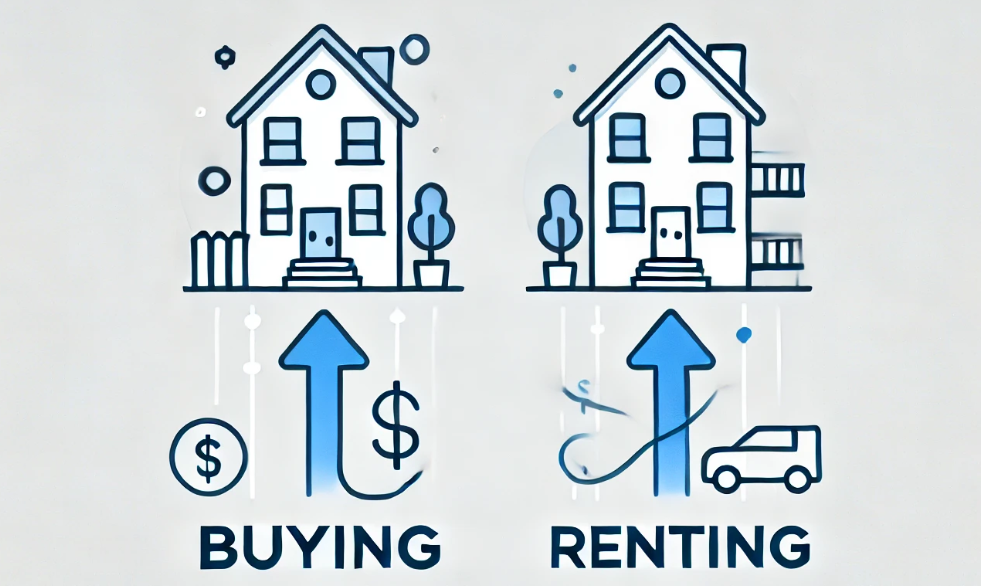- Remittance
- Exchange Rate
- Stock
- Events
- EasyCard
- More
- Download
Buying vs. Renting a Home in the U.S.: Which Is More Cost-Effective? Discover the Best Cities for Bu
For many people who want to live in the U.S., deciding whether to buy or rent a home is a perplexing question. Buying a home means owning a property, which not only provides a stable place to live but can also offer long-term investment returns. Renting, on the other hand, provides more flexibility and lower initial costs, allowing people to choose their living location more freely.
Before making this important decision, it is crucial to understand the advantages and disadvantages of buying versus renting and the market conditions in different cities.

Advantages and Disadvantages of Buying a Home
One major advantage of buying a home is the long-term investment return.
Property values usually increase over time, especially in rapidly developing areas. Renting out the property can generate additional income, providing a continuous cash flow.
Owning your own property also means you can renovate and modify it according to your preferences, enhancing your quality of life. This stability and sense of belonging are significant benefits, and mortgage interest and property taxes can be partially deducted from personal income taxes.
However, buying a home also has disadvantages: high initial costs. Purchasing a home requires a substantial down payment, usually 20% to 30% of the property price, along with transaction taxes, legal fees, and other miscellaneous expenses. Additionally, you need to bear the costs of maintenance and repairs yourself. This can be a significant burden for those without sufficient savings.
When considering buying a home in a city, international fund transfers become an important aspect. BiyaPay, a highly acclaimed international remittance platform, provides local transfer services in most regions and countries worldwide, achieving same-day remittance and supporting large transfers to help you complete your home purchase smoothly. With fees as low as 0.5%, BiyaPay also supports real-time conversion of digital currencies (such as USDT) to major fiat currencies like the U.S. dollar and British pound, making it very friendly for digital currency traders.
Advantages and Disadvantages of Renting a Home
The main advantages of renting are high flexibility and lower initial costs.
Renters can change their residence at any time based on their work location or personal preferences without being tied down by property transactions. This is especially important for those with high job mobility or diverse lifestyles. There is no need to pay a large down payment and various fees; only a deposit and the first month’s rent are required, reducing the financial burden and effort for renters.
The disadvantage is that, in the long term, the total cost of renting might be higher than buying. Rent may increase each year, and some landlords’ lease agreements might not allow you to renovate or modify the house. There is also the risk that the landlord may not renew the lease.
Factors Influencing the Decision to Buy or Rent a Home
Personal Financial Situation
Your income and savings levels determine whether you can afford the down payment and future mortgage repayments for a home purchase. If your savings are insufficient or your income is unstable, renting might be a more realistic option.
Duration of Residence
The length of time you plan to live in one place also impacts the decision. If you intend to settle in a location for a long time, buying a home might be more cost-effective, as long-term property appreciation and rent savings can offset the initial costs.
Family and Career Planning
If you have children, you need to consider the school district and the stability of the living environment, making homeownership more suitable. If your career requires frequent relocation, renting provides the necessary flexibility.
Best Cities for Buying and Renting
Cities Suitable for Buying
Cities ideal for buying a home typically have the following characteristics: high potential for property value growth, strong job market, relatively low cost of living, high quality of life, and good economic development prospects. Examples include Austin, Charlotte, and Phoenix.
Cities Suitable for Renting
Cities ideal for renting usually have high property prices, mature rental markets, high cost of living, and high career mobility. These factors make renting a more economical and flexible choice, especially for those who need short-term housing or frequently change work locations. Examples include New York, San Francisco, and Los Angeles.
Conclusion
Whether to buy or rent a home in the U.S. depends on your personal financial situation, duration of residence, and the characteristics of the city. Buying a home offers long-term investment returns and stability, suitable for those planning long-term residence with good financial standing. Renting provides high flexibility and low initial costs, ideal for those with high career mobility or short-term residence needs.
Regardless of your choice, it is important to make the decision based on your circumstances and future plans. I hope this article provides valuable reference, helping you find the most suitable city to live in the U.S.

























